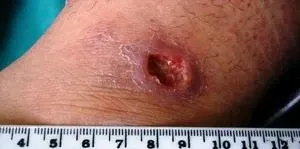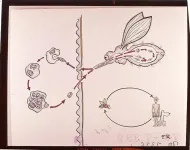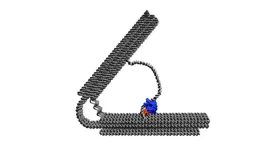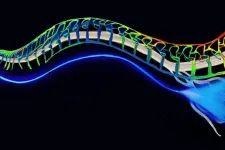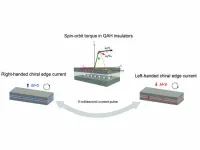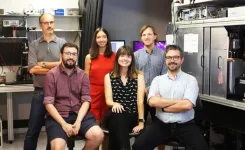(Press-News.org) Each year, approximately 200 to 300 children in the United States are diagnosed with diffuse midline gliomas (DMG), a tumor that begins in the brain or spinal cord.
The tumors cannot be removed through surgery due to their location in the brain, and current treatments are not effective and lead to a nearly zero percent survival rate.
The University of Cincinnati’s Timothy Phoenix is part of a multi-investigator collaborative team with St. Jude Children’s Research Hospital’s Stephen Mack, PhD, and Giedre Krenciute, PhD, that received a nearly $4 million National Cancer Institute (NCI) grant to study how to improve immunotherapy treatments for DMGs. The trio will test if using a single target can both weaken tumors and strengthen immune cells fighting the cancer, leading to more effective treatment.
CAR-T basics
Immunotherapy treatments train the body’s own immune cells to fight cancer, and Phoenix and his colleagues are studying a particular type of immunotherapy called CAR-T therapy. Immune cells called T-cells are harvested from a patient and then genetically modified to target cancer cells.
“When you put them back into the patient, those cells will go and try to find that target and then engage with them and try to kill the cancer cells,” said Phoenix, PhD, a University of Cincinnati Cancer Center researcher and associate professor in UC’s James L. Winkle College of Pharmacy. “In DMG patients, CAR-T-cell clinical trials have shown some promise in terms of there being some response from patients initially, but it has been variable and is usually not durable or a curative therapy.”
Research plan
When giving immunotherapy treatments, different tumors are referred to as being “hot,” meaning immune cells are present in the tumors, or “cold,” meaning immune cells are excluded from the tumor.
Phoenix said DMGs are thought to be cold, so one potential way to make CAR-T more effective is to “heat up” the tumor and make them more likely to attract immune cells. Prior work by St. Jude’s Mack found that inhibiting a process called DNA methylation in DMG cells could potentially make these tumor cells attract more immune cells, so the team is testing if this happens with different DMG models.
“There is very little known about how immune cells interact with brain tumors, and even less known about how changes in these interactions impact immunotherapies like CAR-T cells,” Phoenix said. “Would CAR-T cells be more attracted to the tumor, and would it improve their ability to kill tumor cells?”
Another issue with CAR-T therapy is that the immune cells quickly become exhausted and no longer work. St. Jude’s Krenciute has found blocking DNA methylation in the T-cells gives them more endurance and makes them more effective for longer, meaning inhibiting DNA methylation may not only be beneficial in tumor cells but also in CAR-T cells.
UC’s Phoenix has developed unique DMG animal models the team will use to test how targeting DNA methylation affects DMG and CAR-T cells.
“If you put it all together, now you have a single target (DNA methylation) in two different populations of cells,” Phoenix said. “Targeting it in tumor cells could change the microenvironment and make it more attractive to immune cells coming in, and targeting it in the CAR-T-cells themselves could make them work better. Combining both together has the potential to supercharge things, we hope.”
According to Phoenix, it is not common for a single target to both weaken a tumor and improve the treatment.
“This is something that is relevant for a lot of drug targets but people only tend to look at one cell of interest,” he said. “This is why a larger collaborative team is really necessary. Having multiple groups with unique expertise working together gives us the ability to view these topics with different perspectives and strengthens the overall science.”
Pediatric Immunotherapy Network
This research project is one of six that make up a new NCI Pediatric Immunotherapy Network, an initiative that aims to address current challenges in pediatric immuno-oncology and accelerate the development of effective immunotherapies for pediatric solid tumors.
The network is an expansion of a previous pediatric immunotherapy research collaboration funded by the U.S. National Cancer Institute’s Cancer Moonshot, a program that marshals resources across the federal government to speed progress in cancer research and lead to improved cancer prevention.
All of the researchers that make up the network recently met at NCI headquarters for a kickoff meeting and will continue to meet to share scientific data, ideas and resources to promote collaboration and maximize the impact of each project.
“It’ll be great to interact with these other world-class research teams in the [network] and receive feedback as we continue with this project,” Phoenix said. “In the first meeting we were already discussing ways to interact and collaborate between groups. I’m excited our team is part of [this] and has this opportunity to contribute towards improving outcomes for patients.”
Research reported in this publication was supported by the National Cancer Institute of the National Institutes of Health under Award Number 1U01CA281823-01. The content is solely the responsibility of the authors and does not necessarily represent the official views of the National Institutes of Health
END
University of Cincinnati researcher joins pediatric immunotherapy network
NCI-funded study is testing target to improve CAR-T treatment of pediatric brain tumors
2023-10-19
ELSE PRESS RELEASES FROM THIS DATE:
New study provides ‘genetic fingerprint’ indicating disease spread by sand flies may be gaining firm foothold in the United States
2023-10-19
CHICAGO (October 19) — Scientists have new evidence that a tropical disease once seen almost exclusively in returning travelers is now being detected in the United States in people with no international travel history — and caused by a Leishmania parasite strain that’s distinctly different from “imported” cases, according to an analysis from researchers at the U.S. Centers for Disease Control and Prevention (CDC) presented today at the Annual Meeting of the American Society of Tropical Medicine and Hygiene (ASTMH).
The study, led by CDC scientist Marcos de Almeida, emerged from a curious rise of domestic infections over the last 10 years, ...
Researchers design a pulsing nanomotor
2023-10-19
An international team of scientists headed by the University of Bonn has developed a novel type of nanomotor. It is driven by a clever mechanism and can perform pulsing movements. The researchers are now planning to fit it with a coupling and install it as a drive in complex machines. Their findings have now appeared in the journal Nature Nanotechnology.
This novel type of motor is similar to a hand grip trainer that strengthens your grip when used regularly. However, the motor is around one million times smaller. Two handles are connected by a spring in a V-shaped structure.
In a hand grip trainer, ...
Lactate-producing bacteria inside tumors promote resistance to radiation therapy
2023-10-19
HOUSTON ― Researchers at The University of Texas MD Anderson Cancer Center have discovered that lactate-producing intratumoral bacteria drives resistance to radiation therapy, suggesting that lactic acid-producing bacteria present in various cancers may serve as novel therapeutic targets.
The study, published today in Cancer Cell, reported that a particular bacterial species, Lactobacillus iners (L. iners), caused cancer cells to respond to radiation by rewiring metabolic signaling pathways to resist treatment. The researchers also found that L. iners was associated with poorer clinical outcomes in patients with cervical ...
Researchers document dramatic increase in advanced stage cervical cancer and deaths from cervical cancer in Appalachian Kentucky
2023-10-19
While the overall incidence and death rates from cervical cancer have dropped in the U.S., the opposite has been occurring in Appalachian Kentucky – a steady increase. The death rate from cervical cancer in Appalachian Kentucky is now twice that of the national rate.
A team of cancer population scientists from MUSC Hollings Cancer Center and the University of Kentucky Markey Cancer Center documented the increase through investigation of county-level data from 2000 through 2019. Their findings are published this month in JAMA Network Open.
“The rapidly growing disparities that we're ...
Researchers discover associations among PTSD, diet, and the gut microbiome
2023-10-19
Study suggests that adhering to a Mediterranean diet may alleviate or prevent posttraumatic stress disorder (PTSD) symptoms
The human gut microbiome has a significant impact on our health. Research has shown that it can influence the development and response of emotions, but the relationship between posttraumatic stress disorder (PTSD) and the gut microbiome has been unexplored. PTSD is a fear-based mental health disorder that develops in some individuals who experience a disturbing and horrifying situation involving severe injury, actual or threat of death, or violence. A new study by investigators from Brigham and Women’s Hospital, a founding member of the Mass General Brigham healthcare ...
COVID-19 vaccination willingness and reasons for vaccine refusal
2023-10-19
About The Study: The findings of this study that involved the use of data from Hong Kong and Singapore suggest that trust in health authorities was fundamental to overcoming COVID-19 vaccine hesitancy. As such, engendering trust in health care professionals, experts, and public health agencies should be incorporated into pandemic preparedness and response.
Authors: Michael Y. Ni, M.D., of the University of Hong Kong, is the corresponding author.
To access the embargoed study: Visit our For The Media website at this link https://media.jamanetwork.com/
(doi:10.1001/jamanetworkopen.2023.37909)
Editor’s Note: Please see the article ...
Developmental trajectory of body weight in youths at risk for major mood disorders
2023-10-19
About The Study: In this study of 394 individuals, females with a family history of mood disorders were prone to weight gain starting around puberty and predating mood disorder onset. Early interventions aiming to prevent adverse mental and physical outcomes in this vulnerable group need to start in childhood.
Authors: Rudolf Uher, M.D., Ph.D., of Dalhousie University in Halifax, Nova Scotia, Canada, is the corresponding author.
To access the embargoed study: Visit our For The Media website at this link https://media.jamanetwork.com/
(doi:10.1001/jamanetworkopen.2023.38540)
Editor’s ...
Soft optical fibers block pain while moving and stretching with the body
2023-10-19
Scientists have a new tool to precisely illuminate the roots of nerve pain.
Engineers at MIT have developed soft and implantable fibers that can deliver light to major nerves through the body. When these nerves are genetically manipulated to respond to light, the fibers can send pulses of light to the nerves to inhibit pain. The optical fibers are flexible and stretch with the body.
The new fibers are meant as an experimental tool that can be used by scientists to explore the causes and potential treatments for peripheral nerve disorders in animal models. ...
Electrical control of quantum phenomenon could improve future electronic devices
2023-10-19
UNIVERSITY PARK, Pa. — A new electrical method to conveniently change the direction of electron flow in some quantum materials could have implications for the development of next-generation electronic devices and quantum computers. A team of researchers from Penn State developed and demonstrated the method in materials that exhibit the quantum anomalous Hall (QAH) effect — a phenomenon in which the flow of electrons along the edge of a material does not lose energy. The team described the work in a paper appearing today (Oct. 19) in the journal Nature ...
A change in rigidity switches the function of protein condensates involved in sensing touch
2023-10-19
Touch plays a fundamental role in our physical, emotional, and social well-being. From a primary way of conveying emotions to sensory integration, it is crucial for the complex growth of cognitive, emotional, social, and behavioral abilities especially during the early development of infants and children. Touch allows us to build connections with others, eases pain and stress, and helps us to understand the world around us giving crucial information such as the texture, temperature, and shape of objects.
When sensing any stimuli, such as when the body is being touched, the mechanical signals are transformed into biological responses ...
LAST 30 PRESS RELEASES:
Science reveals why you can’t resist a snack – even when you’re full
Kidney cancer study finds belzutifan plus pembrolizumab post-surgery helps patients at high risk for relapse stay cancer-free longer
Alkali cation effects in electrochemical carbon dioxide reduction
Test platforms for charging wireless cars now fit on a bench
$3 million NIH grant funds national study of Medicare Advantage’s benefit expansion into social supports
Amplified Sciences achieves CAP accreditation for cutting-edge diagnostic lab
Fred Hutch announces 12 recipients of the annual Harold M. Weintraub Graduate Student Award
Native forest litter helps rebuild soil life in post-mining landscapes
Mountain soils in arid regions may emit more greenhouse gas as climate shifts, new study finds
Pairing biochar with other soil amendments could unlock stronger gains in soil health
Why do we get a skip in our step when we’re happy? Thank dopamine
UC Irvine scientists uncover cellular mechanism behind muscle repair
Platform to map living brain noninvasively takes next big step
Stress-testing the Cascadia Subduction Zone reveals variability that could impact how earthquakes spread
We may be underestimating the true carbon cost of northern wildfires
Blood test predicts which bladder cancer patients may safely skip surgery
Kennesaw State's Vijay Anand honored as National Academy of Inventors Senior Member
Recovery from whaling reveals the role of age in Humpback reproduction
Can the canny tick help prevent disease like MS and cancer?
Newcomer children show lower rates of emergency department use for non‑urgent conditions, study finds
Cognitive and neuropsychiatric function in former American football players
From trash to climate tech: rubber gloves find new life as carbon capturers materials
A step towards needed treatments for hantaviruses in new molecular map
Boys are more motivated, while girls are more compassionate?
Study identifies opposing roles for IL6 and IL6R in long-term mortality
AI accurately spots medical disorder from privacy-conscious hand images
Transient Pauli blocking for broadband ultrafast optical switching
Political polarization can spur CO2 emissions, stymie climate action
Researchers develop new strategy for improving inverted perovskite solar cells
Yes! The role of YAP and CTGF as potential therapeutic targets for preventing severe liver disease
[Press-News.org] University of Cincinnati researcher joins pediatric immunotherapy networkNCI-funded study is testing target to improve CAR-T treatment of pediatric brain tumors

